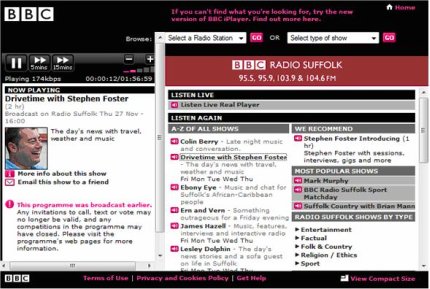"I divide the numerous 'value from content' plans into four general categories: (a) the paywall, (b) tracking users for ads (c) tracking content for extraction (d) reinstate online scarcity via legal doctrine."This is a well-written but incomplete overview of business models in trial for digital media. It (especially point a and b) gives a nice and brief summary and analysis of the action on commercial side of action. On the non-profit side, to my observation, people are also trying the following models:
- Membership: users purchase membership for experience or benefits. E.g. Folk Alley, Guardian.
- Commission: users commission the coverage of a story by paying part of its cost. E.g. Spot.us, PublicPress
- Foundation: operation is fully supported by a foundation. E.g. Kaiser Health News
- Subsidy: non-profit part of the operation is supported by its commercial part. E.g. BBC Worldwide, the main commercial arm of BBC, generates revenue and re-invest part of it in BBC's public service programming.
This 2008 online survey studied the shifting demands of digital consumers in six countries, and offered strategy suggestions to content owners, media distributors, and agencies. Three categories of consumers have emerged from the study:
- Massive passives: slow adopters
- Gadgetiers: early adopters, cash rich, time poor
- Kool kids: youth, quick adopters, cash poor, time rich
#3: Improvements to BBC Local Radio online
#4: BBC iPlayer Local Radio Integration
"You will see we are no longer purely in the land of software. We are now into setting up new processes, re-engineering the business chain and finding people to use these tools to put together a consolidated data view of a Local Radio schedule which could drive interactive services."
 This is a detailed account how BBC finally integrated all 40 local stations' audio and schedule content into iPlayer, BBC's sleek multimedia player. There are plenty of not only technical but also organizational and business challenges. BBC's experience provides valuable insights and lessons to American public broadcasters as we, as individual stations and as one collective system, are searching for more effective ways to deliver content and serve the audience.
This is a detailed account how BBC finally integrated all 40 local stations' audio and schedule content into iPlayer, BBC's sleek multimedia player. There are plenty of not only technical but also organizational and business challenges. BBC's experience provides valuable insights and lessons to American public broadcasters as we, as individual stations and as one collective system, are searching for more effective ways to deliver content and serve the audience.
No comments:
Post a Comment